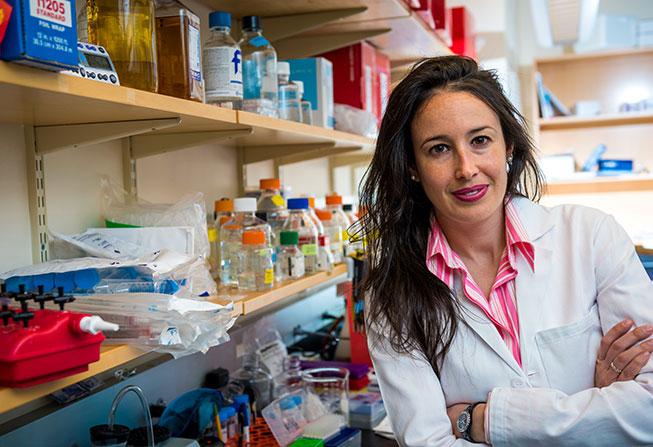Research in Pediatric Solid Tumors

Laboratories in the Department of Pediatric Oncology are leading the charge to understand pediatric cancers at the molecular level. The breadth of pediatric solid tumor diagnoses poses a unique challenge — research efforts must focus on individual disease pathophysiology, but also innovate across disease subcategories. Through basic, translational, and collaborative research efforts, the Solid Tumor group is focused on identifying new therapeutic targets and biomarkers in pediatric solid tumors.
Solid Tumor Research
Understanding the Molecular Underpinnings of Disease Growth, Signaling, and Therapy Resistance
Faculty in our Solid Tumor Program continue to lead laboratory-based efforts focused on the genetic and epigenetic determinants of pediatric solid tumors, including neuroblastoma, Ewing sarcoma, osteosarcoma, rhabdomyosarcoma, synovial cell sarcoma, and rhabdoid tumors. Much of the work focuses on pathways germane to tumor pathophysiology, with many recent discoveries geared towards bench-to-bedside translation:
- The in-depth study of mechanisms of therapy resistance in neuroblastoma and Ewing sarcoma focused on transcriptional reprogramming and alterations in chromatin modifying complexes
- Ongoing work to understand oncogenic fusion proteins as a driver of pediatric sarcomas and the role of protein degradation as a means by which to target these fusions
- Continued progress in identifying novel therapeutic targets through increased understanding of critical oncogenic transcriptional and signaling pathways
- The discovery that dual targeting of CDK4/6 and IGF1R in Ewing sarcoma profoundly represses the cell cycle and cell signaling, leading to design of a novel early-phase clinical trial
- The identification of CDKs 7 and 12 as therapeutic targets in Ewing sarcoma, neuroblastoma, and osteosarcoma
Comprehensive Tumor Biobanking, In-Depth Genomic Evaluation, and Serial Analyses of Circulating Tumor DNA
Faculty in the Solid Tumor Program lead a comprehensive, nationally-recognized tumor genomic profiling effort aimed at the in-depth analysis of every new solid tumor diagnosis. Discovery of novel targeted anti-cancer therapies and companion biomarkers have led — in collaboration with our Experimental Therapeutics group — to the development of several investigator-initiated and multi-institutional phase 1, 2, and 3 clinical trials:
- The recognition that tumors with SMARCB1 loss may be susceptible to checkpoint inhibition resulting in a multi-institutional dual checkpoint-inhibitor trial for patients with SMARCB1/INI-1 deficient tumors
- Novel combination therapies for relapsed/refractory osteosarcoma
- Analysis of cell-free circulating tumor DNA across solid tumors to identify biomarkers of risk category and response to therapy
- Creation of a comprehensive tumor biobank to support future research initiatives
- Single-cell interrogation of the tumor immune microenvironment and identification of therapeutically relevant biomarkers
Cell Line Creation and Xenograft Modeling
The Solid Tumor Program works collaboratively with the Broad Institute and Dana-Farber to generate new, minimally-passaged pediatric cancer solid tumor cell lines and PDX (patient derived xenograft) models of pediatric solid tumors. This work will allow:
- Study of novel drug screens and potential initiation of co-clinical trials
- Identification of cancer dependencies through genome-scale loss-offunction screens
Clinician-Led Research Consortia Focused on Basic and Translational Initiatives
Clinically, our faculty are world leaders in the care of pediatric patients with neuroblastoma, bone tumors, soft tissue sarcomas, liver, kidney, and germ cell tumors, retinoblastoma, and other rare tumors. As a regional, national, and international referral center for pediatric solid tumor patients, our clinicians are focused on the delivery of exceptional care while founding research-driven consortia to drive basic and translational research discovery. Examples of such initiatives include:
- Boston Bean Research Consortium (Kidney Tumors)
- BCH/DFCI Liver Tumor Center of Excellence
- Malignant Germ Cell International Consortium
- NCI-COG MATCH (Molecular Analysis for Therapy CHoice) trial
- Cancer Predisposition Clinic
- Cancer Survivorship and Late Effects Clinic
- Quality Improvement Initiatives
- Population Science communication-based studies and exploration of the divergent pathophysiology of disease dependent on socioeconomic factors
Current Work in Our Labs
The Crompton Lab focuses on identifying new treatment approaches for patients with pediatric sarcomas, as well as translating genomic sequencing approaches including circulating tumor DNA analyses for clinical application in pediatric solid tumors.
The George Lab aims to understand gene regulatory mechanisms that are aberrant in pediatric cancer, with a specific emphasis on neuroblastoma and osteosarcoma, and to identify strategies to target these therapeutically.
The Kadoch Lab studies biochemical mechanisms of oncogenic BAF complexes, with an emphasis on dissecting their roles in human disease and identifying new therapeutic opportunities.
The Look Lab researches cancer genetics using the zebrafish genetic system to clarify developmental pathways subverted in pediatric tumors.
The Stegmaier Lab applies an integrated approach to discover new therapeutic opportunities in neuroblastoma and Ewing sarcoma with deep genomic characterization of primary tumors, kinase activity profiling for immediately druggable targets, functional genomic screening for new tumor dependencies, and chemical screening for modulators of relevant oncogenic drivers.